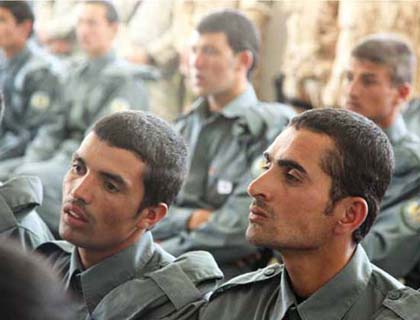Nowadays talks in political circles and among pundits in Afghanistan are mostly about the post-withdrawal situation and transition process since the US and NATO troops are going to start pulling out from next month. President Obama is going to announce his withdrawal plan and the number of outgoing troops in coming weeks. In Afghanistan, concerns are regarding the ambiguity of transition and the impact of withdrawal on security, economy and stability. It's not only the hot topic among political circles and policy-advocacy organizations, but also the evening chats of common Afghans, since the news reports have been focusing on these issues nowadays.
Media reports and policy makers have not reflected the public opinion on these issues. Talking to professional educated Afghans in Kabul, one can easily feel the sense of alarm and concern in their reaction. But people in countryside and volatile parts of the country are not aware of these issues and there is less reflection of their thoughts and reaction in local and international media.
However, the civil society, rights organizations, policy advocacy groups and professional educated Afghans in Kabul and other cities are very much concerned. For instance, when Afghan media reported the details of a report by the US Senate Foreign Relations Committee predicting a financial disaster in Afghanistan after 2014, it was an alarming topic on every tongue in the capital, which is hugely flourishing on Western dollars and could face an ultimate collapse in the booming banking, housing and industrial production sectors. For instance a friend of mine and sociopolitical commentator Hadi Zaher reacting to the reports of Afghan economic disaster in the US said "a giant bubble has been forming in the housing/land market in the major cities for the last decade. The question now is not about if but when it will burst.
Even many Afghan investors are sticking around because of international military presence, once the shield is shaky, they are likely to flee. Up until a month ago, land prices in many suburbs in Kabul were almost equal to prices in suburbs in metropolitan cities in the West. Average investor has half a foot in Kabul and weight in Dubai or elsewhere. Fundamentals of the Afghan economy are notoriously weak, thus likely to plummet. Property prices in Kabul housing schemes are unsustainable and rising independently of booms elsewhere in the Afghan economy. Assume adjustment in aid changes wage structures and they fall, large share of skilled workforce or returned exiles are unlikely to stay. Over the last few years GDP growth has been very volatile - differing by up to 30 percent between two consecutive years, inflation running in the 30s. The US is Afghanistan's largest export market, how's that likely to change once 'transition' occurs?"
Though the predictions of economic disaster lack serious argument, reaction on these reports work as a thermometer to measure the alarming sense of concern among masses, which is not properly reflected in media.
Besides the economic disaster tale, serious concerns are expressed about the political and security situation in the post-withdrawal Afghanistan. It is common nowadays to hear ordinary Afghans in Kabul fearing a return of the 90s era while talking about the US/NATO withdrawal and the uncertain future. Civil society representatives and analysts are of the view that the transition process is very murky and ambiguous. A policy advocacy activist and civil society representative while talking about the transition process the other day told "it is very ambiguous. The success of the transition seems to be all depending on certain conditions and outcome of the political settlement being talked about. There is no risk-management options considered! Suppose the planned transition in any of the targeted provinces results in complete failure and the Afghan security forces fail to maintain security, what will be the choice of the US and NATO? It's not clear! "
These concerns are going to get reflected more strongly. Already policy advocacy organizations and think-tanks in Kabul have started debates to reflect these concerns about the impact of the withdrawal of international troops. For instance, a policy advocacy organization and think-tank The Mass Movement Mobilization of Afghanistan is going to convene a high-level conference in Kabul in coming weeks inviting top security analysts, scholars, political experts, politicians and diplomats to discuss the impact assessment of withdrawal on political stability in Afghanistan and particular effect on the most vulnerable segments of Afghan society like women. The organizers of the conference think "the current superfluous debate portraying the positive impact of a political settlement with the Taliban and post-withdrawal transition does not reflect the concerns and anxieties of the majority of the Afghan people and civil society."
One reason for such deep concerns is that the stakeholders do not bother to keep the public informed about the process. Things are unclear; therefore an alarming sense of concern is prevailing among masses.
According to a report on the Daily Beast yesterday, President Obama is likely to announce the withdrawal plan starting from next month on July 15. The report says the US troops—currently about 100,000—will be reduced by upward of 30,000 over the next 12-18 months. However these troops to be pulled out from next month constitute the number of troops—30,000—deployed in the surge of 2009. And there will still be about 70,000 US troops. But the decision announced earlier by NATO and Washington to withdraw all combat troops from Afghanistan by 2015 remains firm.
The fact is that all stakeholders including the international community and the Afghan Government know these concerns of the masses, and the fact that once the process of withdrawal starts and it gets more coverage in local Afghan media with intense discussions generating awareness, public reaction will be more visible. The stakeholders should bother to listen and consider addressing these concerns; otherwise it will be the first factor for failure of the entire process.

